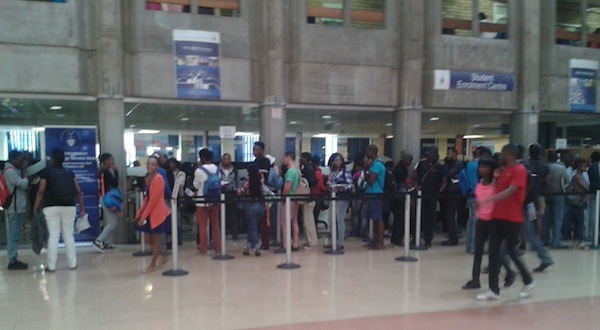On Wednesday, the National Student Financial Aid Scheme (Nsfas) briefed parliament on the scheme’s readiness for the 2020 academic year. NSFAS Administrator Dr. Randall Carolissen briefed parliament on the disbursement of funding and student allowances for the current academic year.
In 2018 then minister of higher education and training Naledi Pandor placed the aid scheme under administration, following a request from the board. The call came due to the failures by Nsfas to pay out bursaries to approved beneficiaries. The aid scheme which was severely constrained already was placed under more pressure with the 2017 free education announcement. Nsfas was responsible for distributing the funds for the free education system. Carolissen was appointed by Pandor to take over the scheme that was facing a number of issues. This included a collapse in governance, system instability, and a compromised disbursement process.
Carolissen gave updates on this and more to the department of higher education and training portfolio committee.
Achievements of administration
Carolissen went through the achievements the aid scheme has enjoyed since being put under administration. This includes successful payments to institutions and students during the first week of February for the first time in Nsfas history. He said that a lot of work has been done to stabilise the institution and place it on a sustainable basis.
“The redesign of NSFAS must proceed once calm has been restored to the sector to ensure that the imperatives of social inclusion, poverty reduction, and equity is realised. We owe it to our young people and to our broader society to make NSFAS work,” said Carolissen.
Successful disbursement of funding
On Wednesday, social media was flooded with people celebrating the payment of their Nsfas allowances.
According to Carolissen, the aid scheme has disbursed more than R21 Billion of the R22 Billion budgeted for 2018 funding cycle. He attributed this success to a relatively stable system as well as a deployment of senior managers to clean up the data.
Nsfas has also collaborated with student leaders on campuses around the country to trace students that did not sign their contracts. In his presentation, Carolissen said in order to ensure that affected students are disadvantaged going into 2019, the scheme shared “detailed information with institutions to enable qualifying students to register.”
Carolissen also announced that the aid scheme doubled the number of applicants in the space of a year. Figures submitted before the committee showed that NSFAS approved financial aid for 442 380 students at universities and colleges in 2019. This was out of a total of 546 499 applications. The number of applicants had been 267 866 for the previous year. He attributed this to a comprehensive social media campaign.
Readiness for the 2020 Academic year
Applications for the 2020 academic year opens September 1 and closes November 30. Nsfas announced that the new improved online system includes the fast-tracking of the grant recipient. Learners with disabilities will also supposedly have an easier application process. They will not need to get any additional forms from a doctor. Student applicants will be need to prove their identity through their name, surname, and identity document number.
Nsfas will also be engaging with relevant role-players to ensure more access points for applications. This will include universities and technical and vocational education and training (TVET) colleges. Nsfas will also increase their presence at application venues during the application windows.
Plans for the second year of administration
Next year – 2020 – will mark the second year that Nsfas is under administration. Carolissen said they plan to conclude various forensic investigations. A new executive team will be appointed. There will be a rebalancing of the management and technical human capital teams. There will be a review of all systems and an entrenchment of quality management and governance.
The aid scheme also plans to restructure its data systems. They aim to transfer of skills from consultants and advisors to permanent staff. Finally, there are plans to introduce a performance management and accountability framework.
VBS Bank contract
Amongst the many risks identified by Nsfas was poor financial controls. They announced that previous audit reports highlighted the extent of dysfunctionality. One of the interventions they made since is the termination of a contract with VBS Mutual Bank which violated the Public Financial Management Act prescripts.
Carolissen admitted that Nsfas had awarded a tender to the controversial bank. This tender was to disburse allowances to students at TVET colleges. VBS Mutual is the bank at the center of the report released on October 2018. The report VBS: The Great Bank Heist detailed how 3 people illegally received R1,89 billion between 2015 and 2018 from the bank. This left many people without their pension and grant funding.
In a statement released after the briefing, the Democratic Alliance (DA) called this an “outrageous revelation.” Baxolile ‘Bax’ Nodada, the party deputy spokesperson on higher education, science and technology said: “it is completely unacceptable that an entity mandated to provide educational opportunities to the poorest members of our society has possibly lost millions to VBS.”
The party has said it’s of national and public importance “that NSFAS must be completely transparent in its responses.”
NSFAS system and media briefing
On Thursday, just days before applications opened, Nsfas held a special media demonstration. This was to showcase the new MyNSFAS online portal enhancements and updates.
On September 2, minister of higher education, science and technology Dr. Blade Nzimande, and Carolissen will brief the media on the opening of the NSFAS 2020 application cycle. Nzimande will give updates the NSFAS 2020 application cycle opening and closing dates.









